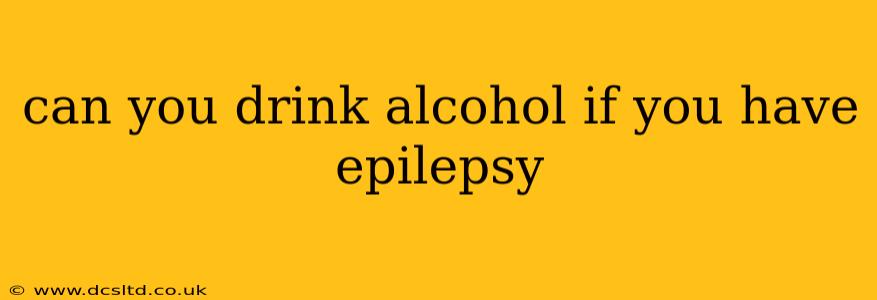Epilepsy and alcohol consumption: a complex relationship. For individuals living with epilepsy, the question of whether or not they can drink alcohol is a crucial one, often fraught with concern and conflicting information. The short answer is: it's generally advised to avoid alcohol or drastically limit consumption if you have epilepsy. The reasons are multifaceted and involve potential interactions between alcohol and epilepsy medication, as well as alcohol's inherent effects on the brain.
This article will delve into the complexities of alcohol consumption and epilepsy, addressing common concerns and providing evidence-based guidance. We'll explore the potential risks, the role of medication interactions, and offer advice for making informed decisions about alcohol use.
What are the Risks of Drinking Alcohol with Epilepsy?
Alcohol's impact on the brain is significant, and this can be particularly problematic for those with epilepsy. Several risks are associated with alcohol consumption in individuals with this condition:
-
Increased Seizure Risk: Alcohol is a known central nervous system depressant. This means it can slow down brain activity, potentially triggering or worsening seizures in susceptible individuals. The risk is heightened in those with uncontrolled epilepsy or who are taking certain anti-epileptic drugs (AEDs). The mechanism isn't fully understood, but the disruption of brainwave patterns is a key factor.
-
Medication Interactions: Many AEDs interact negatively with alcohol. Alcohol can either reduce the effectiveness of the medication, leading to more frequent seizures, or increase its side effects, potentially causing further complications. The specific interactions vary depending on the type of AED being used. Always consult your neurologist or physician before consuming any alcohol while on epilepsy medication.
-
Withdrawal Seizures: In individuals who regularly consume alcohol, sudden cessation can lead to alcohol withdrawal, a potentially dangerous condition. Withdrawal symptoms can include seizures, even in individuals without a history of epilepsy. This risk is amplified in those with epilepsy. Gradual tapering under medical supervision is crucial if alcohol reduction is necessary.
-
Sleep Disruption: Alcohol can disrupt sleep patterns, and poor sleep is a known trigger for seizures in some individuals with epilepsy. The combined effect of alcohol and disrupted sleep can further elevate seizure risk.
Can Alcohol Trigger Seizures?
Yes, alcohol can trigger seizures in people with epilepsy. While not everyone experiences this, alcohol's effect on brain function makes it a potential seizure trigger for many. The risk is influenced by several factors, including the amount consumed, individual susceptibility, and the type of epilepsy.
What Happens if You Drink Alcohol While Taking Epilepsy Medication?
The consequences of mixing alcohol and epilepsy medication vary considerably, depending on the specific AED. Some AEDs may have their effectiveness reduced, leading to an increased risk of seizures. Others may experience amplified side effects due to the interaction with alcohol. This is why it's absolutely essential to discuss alcohol consumption with your doctor or neurologist before even considering drinking alcohol while on medication. They can advise you on the specific risks associated with your medication and provide personalized guidance.
What Should I Do if I've Already Drank Alcohol and Have Epilepsy?
If you've already consumed alcohol and have concerns about a potential seizure, contact your doctor or seek immediate medical attention. Don't hesitate to reach out, especially if you experience any unusual symptoms or changes in seizure frequency.
Is it okay to have a small amount of alcohol if I have epilepsy?
While some individuals with well-controlled epilepsy and on stable medication might believe they can tolerate small amounts of alcohol, the risk remains. Even small amounts can influence brain activity and potentially interact with medications. The safest course of action is to completely abstain from alcohol or to severely restrict its consumption, only after having a detailed conversation with your neurologist.
In conclusion, while the relationship between alcohol and epilepsy isn't always straightforward, the potential risks often outweigh any perceived benefits. Open communication with your healthcare provider is key to making informed decisions about alcohol consumption and managing your epilepsy effectively. Remember, your health and safety are paramount.
